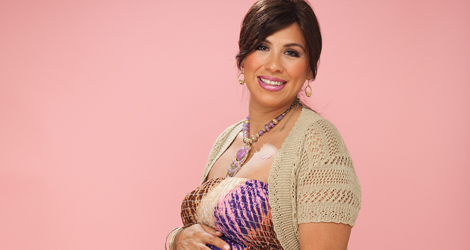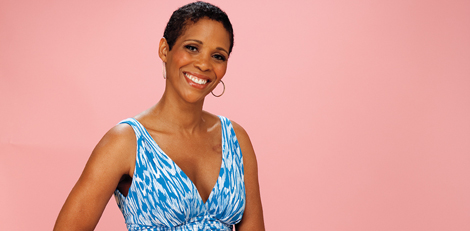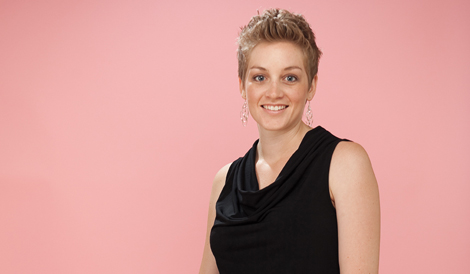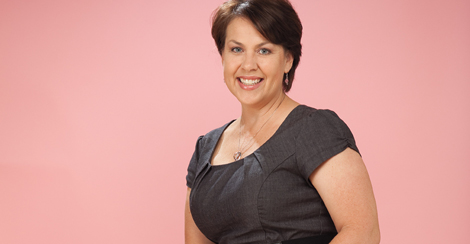From a 25-year-old student to a long-time breast cancer activist, four valiant Valley breast cancer survivors share their stories of strength and struggles as well as their hopes for the future.

“Life is short and we have to embrace everything about life, whether it is
a positive or negative, because you don’t know what will come from it.”
Lucia Schnitzer
When Lucia Schnitzer’s first child was 6 months old and nursing, the new mom experienced discomfort in her breast, assuming it was a clogged milk duct. At the urging of her husband, Ken, she visited her doctor and, on May 26, 2005 at age 34, she was diagnosed with Stage 2 Level 3 breast cancer. (Her sister-in-law—who had also recently had a baby—had been diagnosed with Stage 3 cancer five months earlier. She is also a survivor.)
“It was very scary having a baby and being a new mother and not knowing if you are going to be here long enough to see your baby grow up,” Schnitzer says. “I just remember being upset. I am a good person, a healthy person—why is this happening to me? I realized that, wait a minute, we are all given challenges in life—health or financial, I could name a long list of challenges. I realized that this is my challenge. I am a religious woman. I said, ‘God, you picked me for whatever reason to carry this and own this, so I am going to be graceful about it and do whatever I need to do to take this to where I need to take this.’ And I did. Instead of being angry, I embraced it. When I made that mental change, it made it easier to deal with it. At the end of the day, it has made me a strong woman, a wiser woman.”
After six months of treatment, including a lumpectomy, eight rounds of chemo and radiation, Schnitzer was cancer-free. As a result of her diagnosis, the now-mom-of-three (with a fourth child due this fall) changed the types of foods she put in her body, prompting her and Ken to launch a Phoenix market where Valley dwellers can enjoy delicious, yet healthful, foods. In 2009, Luci’s Healthy Marketplace opened its doors. Not only can locals satisfy their health-food cravings, but Schnitzer also has an open-door policy when it comes to patrons dealing with a cancer diagnosis.
Apart from the literal pitter-patter of little feet, Schnitzer is also working on the arrival of her other “baby”: a cookbook “for busy mommies and daddies who are having a hard time finding the time and resources for healthy meals. I want to give them the confidence that they can provide fantastic, healthy meals.” The book is slated for completion in 2013.

“I am the poster girl for [the importance of] knowing your body.”
Barbra Watson-Riley
For years, and in whatever city she called home, Barbra Watson-Riley was involved in causes for breast cancer awareness. Her daughter even did her first Susan G. Komen for the Cure cancer walk at 3 months old in a stroller. Last September, at age 43, Watson-Riley’s activism would take on an entirely new meaning when she was diagnosed with an aggressive triple-negative breast cancer. “I probably had a better reaction because of all the work I had done in breast cancer,” she says. “I was equipped with better info. My main focus was my daughter, who was 9 at the time.”
Due to the aggressive nature of the cancer (she had a clear mammogram just a few months prior), chemo was started immediately. After that, everything that could go wrong, did. After her fifth round of chemo, Watson-Riley noticed a change in the tumor in her breast. “In a week, my cancer had grown back and doubled in size,” she says. After an emergency double mastectomy, she suffered internal bleeding, causing an additional surgery. Once she finished her chemo treatments, Watson-Riley once again noticed “something funny.” “It was more cancer,” she says. After the removal of the cancer, she underwent six weeks of radiation which resulted in third-degree burns that might prevent her reconstruction process.
Now that Watson-Riley has been given a clean bill of health, she plans to continue her involvement with breast cancer causes—a disease that hits even closer to home than when she joined the Susan G. Komen for the Cure Phoenix affiliate board in 2010. “I am extremely committed to giving cancer real-talk for people to understand what you are really going through,” she says. “There are people out there who have no clue. I just want to be part of that discussion.”
Though this month always had a significance to this wife and mother of one as Breast Cancer Awareness Month, this October marks a year since her diagnosis. “This year will be different because it will be a celebration,” she says. “It will be the end of my journey. It will be the beginning of the next step of my life. It is not just a month; it is a lifestyle.”

“I really did just go through this, and I am not the same person. How do
you pick up the pieces and continue?”
Mikala Edwards
During their mid-20’s, most young adults are thinking about moving into an apartment, settling into their career and worrying about which happy hour to enjoy on Friday night. Mikala Edwards, though, was recovering from a bilateral mastectomy. Around this time last year, Edwards found a lump in her breast during a self-exam at age 25. “I knew my body, and I knew something was wrong,” she says. At the time, Edwards was working both full- and part-time jobs, volunteering and preparing for her master’s degree in public administration with an emphasis on government and policy at Grand Canyon University.
Instead of breaking down, Edwards faced her diagnosis with a very matter-of-fact attitude: “I had a sense of knowing before I was told. So when they actually told me, my parents lost it but I was prepared for it. I was more like, OK, we have the diagnosis. Let’s get this over with so I can get on with my life. Now we know, now we can make decisions toward me getting better.” Two weeks after she found the lump, she received a breast cancer diagnosis at the John C. Lincoln Breast Health and Research Center. Shortly after, she started eight rounds of chemo, followed by a bilateral mastectomy and radiation. As an active person, Edwards now struggles with muscle weakness in her arms and chest as a result of the surgery.
Though such a devastating diagnosis—especially at such a young age—might have sent others into a tailspin, Edwards knew that her struggle wouldn’t be in vain. “I have a huge faith, so I knew right away going into it that I was getting cancer for a reason.” Now cancer-free, Edwards is back at school and has changed her degree to healthcare administration and plans to graduate in the spring. With her education, she hopes to help young women who have faced a similar diagnosis. She is currently working with the Young Breast Cancer Survivor Initiative to develop support services and educational awareness to young women in Arizona. Edwards also spends her time volunteering with the Young Survival Coalition and taking part in research studies. “It is healing to be able to help someone else,” she says.

“You find a new normal and you find a new life. You can’t help but be
changed by the diagnosis of cancer, especially at such a young age. You
have to find out what that new you is.”
Paulla Miller
At 28, Paulla Miller first noticed a lump in her breast. She was reassured by doctors for years that it was nothing to worry about because she had been nursing, was athletic or was too young to be facing something serious. It wasn’t until seven years later, in 2008, that Miller was diagnosed with an advanced breast cancer after experiencing tingling and numbness in her hands. Three large tumors had been discovered in her breast. “I didn’t go through the anger stage because, for me, my disease was so far advanced at that time that I hit survival mode,” she says. “I had a 12-year-old and a 9-year-old at the time, and I had to be here for [them].”
To combat the disease, Miller underwent 15 exhausting and physically taxing months of treatment, starting with chemo 10 days after her diagnosis. “I had to push through because it wasn’t going to beat me,” she says. In addition to eight rounds of chemo (“By my sixth treatment, I had a nuclear scan and it showed absolutely no evidence of disease,” she says), Miller faced a bilateral mastectomy, 32 days of radiation, a hysterectomy and final breast reconstruction. Even though Miller admits that the treatment and recovery process has made it a little more challenging to exercise and have stamina, she remains active with her kids and their friends. “I made a point to make sure that I was not going to be a bump on the couch.”
Though she just celebrated her fourth year of being cancer-free, Miller can’t help but think, “like most survivors, you are just waiting for that shoe to drop and you just can’t count on the fact that it won’t.” Through the uncertainty, Miller now sees her life in a profound new way, viewing every month that approaches as a “privilege.” “Once you are diagnosed and you face death and disease, you don’t sweat the little things and enjoy what really matters in life.” Her future goals: simply to see her son and daughter take their turns walking down the aisle and be around to meet her grandchildren.